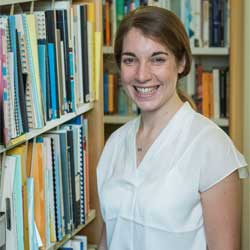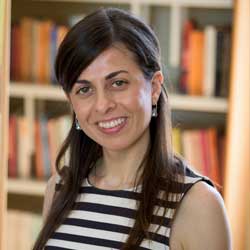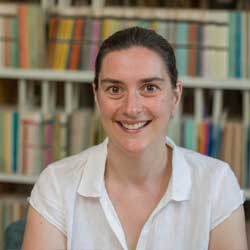Denmark played host to researchers from all over the world at this year's European Conference of Educational Research (ECER) in Copenhagen. Here, Jo, Nicky and Filio from our research division feedback on the presentations that stood out for them this year.
This year's European Conference of Educational Research (ECER) was held in Copenhagen and researchers from both Cambridge Assessment's Group Research Division and OCR presented work and enjoyed a productive four days meeting and talking with delegates from different countries. The conference programming provided the chance to learn about research on closely-related topics in other jurisdictions, and to think about the international similarities (and differences) in education, assessment, and how we go about researching it all.
 Jo Williamson:
Jo Williamson: The research that stood out for me was work presented in the assessment and measurement network on measures of socio-economic status, vital for monitoring variation in education outcomes, and for assessing the results of policy interventions. A team from the Australian Council for Educational Research gave a symposium that focused on improving measurement of socio-economic status in low and middle-income countries. This generated some great discussion about the extent to which the ‘same’ measurement of socio-economic status is possible across different countries, and also about how indicators change within countries over time – “number of books at home” being a particularly interesting example. These ideas were followed up in a number of subsequent sessions. Tobias Stubbe from the University of Göttingen, for example, presented detailed work on the measurement of social and cultural capital in Germany – again, leading to discussion about which indicators captured the intended constructs and how these might (will?) change with time.
The network on educational effectiveness and quality assurance also featured memorable presentations. Bongani Bantwini presented research on teacher shortages in South Africa – particularly in maths and science, and in isolated rural areas. Artë Retkoceri presented her work on concerns about changing standards in school leaving assessments in Kosovo, where the post-war assessment system is still very young. It was excellent to be reminded of the challenges that education and assessment systems face in other parts of the world – and to find many striking similarities in the current issues of concern.
 Filio Constantinou:
Filio Constantinou: The network on mathematics research featured an interesting symposium on the ‘Lexicon project’, a project which compared the professional lexicons of mathematics teachers in a number of countries including Australia, China, Germany and the Czech Republic. The project involved assembling terms typically used by teachers in classrooms in different parts of the world, demonstrating the cultural specificity of teaching terminology. This is a promising project as it can offer insights into the pedagogical philosophy underpinning educational practice in different contexts.
Interesting research was also presented in a symposium organised by the higher education network. The symposium explored the issue of access to higher education, drawing on the work of four theorists: Bourdieu, Archer, Simon and Kahneman. In this symposium, Ciaran Burke explored the role of education in social reproduction using Bourdieu’s concepts of capital, habitus and field. Peter Kahn discussed the interplay between societal structure and individual agency, focusing on the work of Archer. Neil Harrison, on the other hand, shared some theoretical insights into students’ educational choices using Simon’s theory of ‘bounded rationality’ and Kahneman’s ‘prospect theory’. It was interesting and useful to see the issue of access to higher education being approached from such different perspectives. The presentations and the lively discussion that followed them illustrated the benefits of using interdisciplinary research in education.
 Nicky Rushton:
Nicky Rushton: The network on policy studies and politics of education included a very interesting presentation on th these were not associated with the release of PISA results, or PISA reports. The first concerned a study which suggested that the PISA results might be misleading. The second peak had no single cause, but was attributed to the combination of a reference to PISA in the budget, and a series of articles about teacher’s need for competence development. The final peak was caused by a PhD research study, published in an influential newspaper, which suggested that immigration was the main reason for drop in Sweden’s PISA results, although the results of this study were contested by other researchers. The conclusions drawn from the analysis of the PISA coverage were that the media was drawn to sensationalised news rather than proper research. The views of a diverse range of people and organisations were represented in the media coverage, each of whom had their own unpublished agenda. Teachers were often criticised in the media but were not given a voice in any of the debates that ensued.
Jo, Filio and Nicky each presented research at ECER, along with Frances Wilson from OCR. You can read more about their work here.